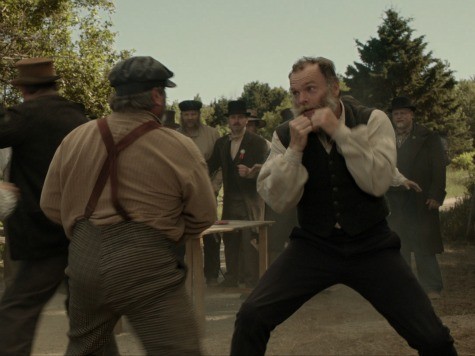
Copperhead is a Civil War drama without bloodshed, blazing muskets or epic battle sequences. Its story is more quiet, but no less profound.
The new film, from the director of Gods and Generals and Gettysburg, takes a different perspective on the War Between the States. The focus is on the home front, the families torn apart by the decision to go to war and the lives lost in the process.
A Copperhead, for the uninitiated, is a Northerner who didn’t want to raise up arms to keep the South from seceding. The term became a commonly used slur, an epithet hurled at those deemed insufficiently patriotic.
Abner Beech (Billy Campbell) is the most prominent “Copperhead” in his town, a humble soul unwilling to shout his position to his neighbors. They know all the same, turning an otherwise upstanding citizen into someone to be viewed with disdain, even hate.
The tensions in the town mount the longer the North and South fight, and a series of local tragedies shows that even those far from the battlefield aren’t safe from the war’s fallout.
Director Ron Maxwell understands the cultural cadences from the era, from the specific speech patterns to the way people went about their daily chores. The film’s first half hour establishes both the characters and their surroundings, grounding the drama yet to unfold in a firm, and utterly necessary, fashion.
Campbell offers a subdued performance that hums with power. He’s a pacifist but no coward, a man who only fears the pain of losing his son Jeff (Casey Thomas Brown) to the battlefield. Abner doesn’t abide by slavery, but he doesn’t think going to war is the answer.
“War ain’t a cure for this. Slavery ain’t right … but killing people, destroying whole cities and towns … that ain’t right either,” Beech says.
It’s no stretch to compare the discussions of war, peace and unity with modern debates in our 24/7 news media age when people are dubbed racist, or worse, for daring to disagree. Maxwell and screenwriter Bill Kauffman, working from the book by Harold Frederic, don’t make those facile connections on screen. It’s left to audiences to connect the dots, giving Copperhead a satisfying subtext.
By setting the tale during the Civil War, Maxwell can explore these topics without falling back on hyperbole or buzz words that would interrupt the storytelling spell being cast.
It’s a hard to see Copperhead as anything but an anti-war statement, but it arrives at that premise without cheap shots or straw men. Any war is a nightmare, whether the conflict is noble or ill-defined. It may be an unavoidable part of the human existence, but the toll it takes on us is profound and far reaching.
Consider a scene where towns folk gather around a posted section of the local newspaper to see if their loved ones have been listed as missing or dead. It’s a haunting moment, treated gingerly by the director in a way that makes it more emotional.
Copperhead ends on a hopeful note, but it’s streaked with melancholy all the same. It’s a Civil War film that gives new meaning to those which passed before it, a necessary addendum to cinema’s take on the subject with images and characters not easily forgotten.
Copperhead opens in select theaters on June 28th. For more information, please visit the film’s website.

COMMENTS
Please let us know if you're having issues with commenting.